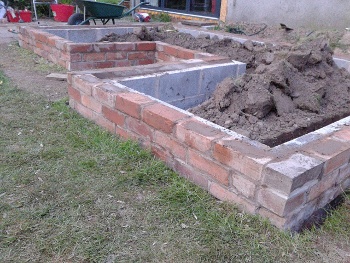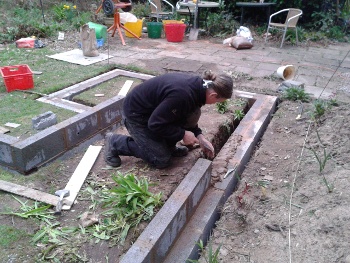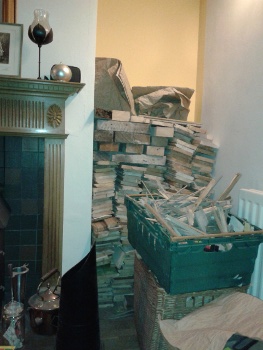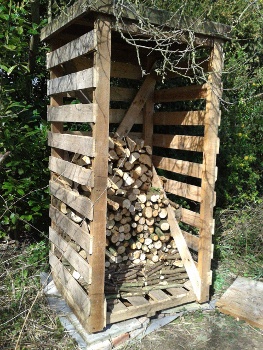## In this issue
– Westacre’s latest
– Seed planting ritual
– faunathing
– What you can do to help Westacre
## Westacre’s latest
Dear friend,
Although the weather isn’t as uniformly gorgeous as it was a couple of weeks ago, Spring is progressing all around us. The plum tree is budding, and the first few twigs of the apple trees are turning pale as they get ready to burst into life. This morning, the thrumming of a woodpecker accompanied my meditation out in the garden.
With the rain, we have returned our attentions indoors. Preparing to pour our concrete floors is quite a process. The floor boards had to come up, and then we had to find homes for them, either as building material for an outdoor wood store, or as burnable bits that fit into the wood burner.
Next, the joists needed to be carefully removed, making sure we didn’t damage the outer wall in the process. Alex is now busy shaping bricks into the right shape to replace them and cementing them into the holes.
His Dad came to help us and shovelled decades old dust and building rubble out of the hole into rubble bags. More is still to come out, and that’s before we start removing the old plaster off the walls.
Alex has also taken out the old heating and gas pipes, and old electrical wire. And he’s pondering how he will make provision for the new wiring and heating system before the concrete goes down.
We always knew we were taking on a huge task when we started this. On cold, rainy days the size of the undertaking can really hit us. We are having to gather our resources of inner strength and time for the cause of actually making progress in this building project.
It has become very apparent that we are both happiest when we are working together on the building project. We feed on each other’s enthusiasm and energy. Progress magically speeds up when we are working as a team. So we have set our intention to really concentrate on the building project and leaving other things until later.
The garden is one of those. We’ll put in some potatoes and leave them to look after themselves for the most part. And the lawn will get mowed, but the rest will suffer benign neglect until we have an actual house to live in.
Hopefully we will find our stride as the sun grows stronger. And hopefully there will be enough time gaps to keep the newsletters coming.
Hilde
## A Seed Planting Ritual
This is a great time for gardening. The new warmth in the Sun warms your heart as well as your back when you plant the first seeds in your garden.
You can do this ritual as you are gardening, with the soil in your vegetable patch and the seeds you are planting anyway. Or you can choose to make this into a more formal ritual and dedicate the seed to a particular project that you would like to see flourish this year.
Begin by gathering your materials. Decide whether you will need a pot and some potting compost. You will definitely need seed – one big one like a broad bean will do – and some water.
As you gather these things, ponder the symbolism of what you intend to do. The compost and soil are made of the growth of years past and the minerals that support life. What are you grateful for?
The seed is a new beginning that you would like to see flourish in the year ahead. It may be a project of your own or something in the wider world that needs to grow. For what cause will you plant your seed?
The water you will use is the nourishment you give to this new beginning. What can you give to this cause?
The sunshine will also help grow your project. You don’t have any control over it. It stands for the blessings of Spirit that support this new beginning. Can you let go of your need to control and leave some of your cause in the care of the Gods?
If you are doing your ritual in a formal circle, perform an opening as you normally would. If you are bringing sacred intent to your vegetable patch, be creative about how you open your rite. Would you like to call to the directions? Or would you simply like to sing to your vegetable patch until both of you feel peaceful and centred? Do whatever feels right and appropriate.
When you are ready, sit down in a comfortable position. Spend some time with the Earth that is present with you. Give the soil and the compost your prayers of gratitude. Remember that all that you have in your life comes from the Earth. Bring these things to mind now, and fill the Earth in your pot or your veg patch with gratitude.
Then hold your seed or seeds in your hand. Bring to mind the new beginning that you want to work with. See its potential in this seed. Imagine what amazing growth can come, what abundant nurture, from just this one seed. Dedicate the seed to your cause or project and fill it with your hope.
Plant the seed of your hope in gratitude. See how the things of the past, the things that you have learned and the efforts that have gone before, will nurture your hope. Now bless the water you have brought. You will have to water this seed a few more times if the days are dry or if you are growing it indoors. What actions can you commit to that will help nurture the new beginning you are working for? Make that commitment as you water your seed.
Now dedicate your planted seed to the Sun. Other than watering when necessary, you will have to leave the process of growing up to the mystery of Life. What do you need to surrender to the Gods in this area of your life?
Sit with your planted seed for another few minutes. Feel yourself supported by the Earth, bursting with hope for the future, nurtured by your own self-care and the care of others, and blessed by the Gods.
When you feel complete, end the rite to balance your opening. Don’t forget to look after your seed, and don’t forget to hold to the commitment you made.
## Futurestory
Somewhere on an internet forum, the word multi-media story telling was mentioned. I was intrigued and asked for a few resources. One of the links given is this web site, $(&^)(*&
There are lots of voicemail recordings, videos and other documents ‘from the future’ that have been ‘decoded’ so we can listen to it now. Together, they tell the story of a possible future or futures for our world in the next 50 years or so.
It is fun to explore the site and piece together your own image of the future from these disparate pieces. You can collect them and order them in a way that makes sense to you, giving your own direction to the unfolding story.
But it’s not easy listening. The future vision that comes from these story scraps is not exactly rosy. The environment has continued to degrade, and people speak of humming birds and snow disappearing. Yet life is carrying on.
Go and have a look and listen for yourself. You may want to use this web site as an opportunity to get in touch with your sorrow for this world. If you do, don’t hold on to it. Let it express itself in your own creativity or your own tears.
## How to help Westacre
We have lots of things that you can help with. Especially with the Spring coming on fast and both of us committing more fully to the building project, we can always do with an extra pair of hands.
In the process, you will learn about what we are doing in our eco-renovation, and how all the different bits work together. Inevitably, you will come across an energy saving trick that looks feasible for your own house.
Do get in touch!
You can find all our contact details at http://www.westacre.org.uk/contact/




